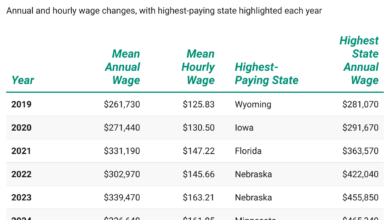How Each U.S. State Taxes Social Security, Pensions, and 401(k) Withdrawals

Curious about how much of your retirement income goes to state taxes? Here’s how every state (and D.C.) stacks up in 2024.
Understanding retirement taxes can be complicated. How much you owe depends on several factors, including the type of income you receive, federal tax rules, and—most importantly—where you live. Some states don’t tax retirement income at all, while others only tax certain types like 401(k) withdrawals or pensions. Even within a state, the tax treatment can vary by income source.
The table below offers a comprehensive look at how each state—and Washington D.C.—taxes various sources of retirement income, including wages, investments, pensions, retirement account distributions, and Social Security benefits.
If you’re thinking about relocating, it’s wise to research how your potential new state treats retirement income. Even if you’re staying put, this guide can help you better understand your current state’s tax policies and how they may affect your retirement finances.
California is considered one of the least tax-friendly states for retirees. While most retirees pay lower rates, high-income earners—especially those still working—can face income tax rates up to 14.4%. The state has nine tax brackets, and starting in 2024, an additional 1.1% payroll tax applies to employees earning over $1 million.
In Washington, D.C., most retirement income is taxable, though residents can deduct up to $3,000. The income tax rate ranges from 4% to 10.75%. Estates over $4,873,200 are subject to an estate tax of up to 16%.
Hawaii exempts certain types of retirement income, but any taxable retirement income is subject to relatively high rates, ranging from 1.4% to 11%. The state also imposes an estate tax on estates over $5.49 million, with rates between 10% and 20%.
Iowa now exempts retirement income from taxes for residents aged 55 and older and will eliminate its inheritance tax starting in 2025. For 2024, income is taxed up to 5.7%, but beginning in 2025, Iowa will switch to a flat tax rate of 3.8%.
Maryland taxes some retirement income, and local counties may add their own income taxes. Retirees aged 65 and older can claim a pension exclusion of up to $39,500. The state has both an estate tax—with a $5 million exemption—and an inheritance tax, which is mostly waived for direct family members but is 10% for others. Income tax rates range from 2% to 5.75%.
Arkansas taxes most types of retirement income, but residents who are 59½ or older can deduct up to $6,000 of eligible retirement income from their taxable income. The state’s income tax rates range from 0% on income up to $5,299 to a top rate of 3.9% on income over $24,300. However, these rates apply only to taxpayers with net incomes up to $89,600; those with higher incomes may enter higher tax brackets more quickly.
Massachusetts taxes most retirement income at a flat rate of 5%. Starting in 2024, income over $1,053,750 is subject to an additional 4% surtax. The state also has an estate tax, with a $2 million exemption and rates reaching up to 16%.




